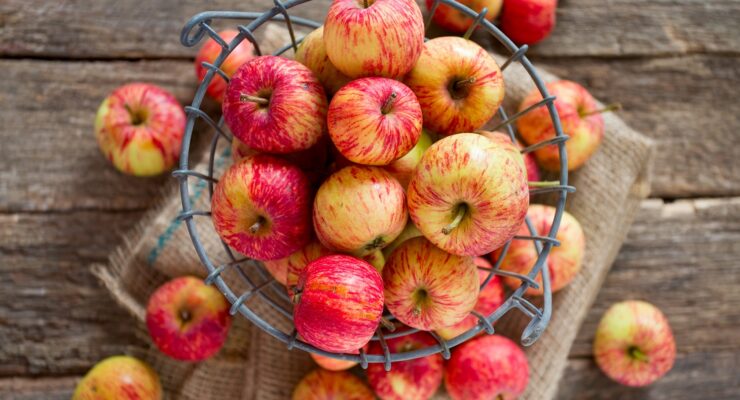5 Heart-Healthy Spring and Summer Veggie Side Dishes
Article posted in: Diet & Nutrition Experts’ Corner
While everyone is buzzing about the latest superfood supplement that promises miraculous health benefits, here’s a little secret: there’s an easier, more affordable, and tastier way to transform your well-being. This magical solution is simply eating the recommended two to three servings of veggies daily.
You probably already know that vegetables are good for you, but here’s something incredible: incorporating just one cup of vegetables into your daily meals can add years to your life. Multiple studies have shown that increasing vegetable intake, even slightly, boosts longevity.
One reason for this is that the fiber, phytochemicals, and antioxidants in vegetables protect heart health, and heart disease is the leading cause of premature death in both men and women.
As a bonus, eating more vegetables also helps manage weight. People who get plenty of vegetables have a naturally easier time maintaining a healthy weight.
These benefits simply cannot be replicated by any supplement on the market and are one of the reasons the Nutrisystem program encourages you to include as many non-starchy vegetables as you want in your plan.
Despite this, most people can’t seem to get excited about boosting their vegetable intake. In fact, a recent analysis estimates that only 1 in 10 adults meet recommended amounts.
Fortunately, spring and summer are among the best times of the year to crush your veggie goals. These seasons provide abundant opportunities to indulge in freshly harvested, nutrient-packed vegetables that protect your heart.
Read on to learn about selecting in-season veggies that enhance heart health. Then get inspired by five mouthwatering, heart-healthy veggie side dishes to savor throughout the warmer weather.
Why Eating Seasonally is Better For You
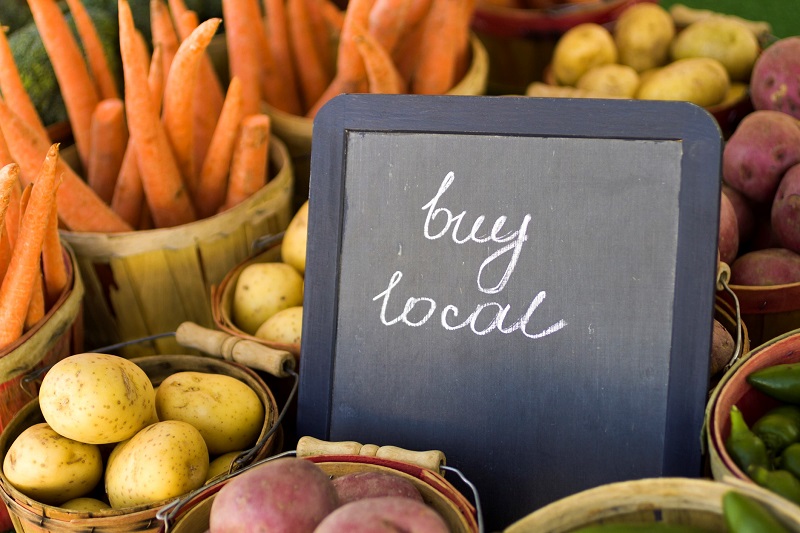
While our modern food system provides us with the convenience of accessing a wide range of foods year-round, embracing in-season foods in your healthy veggie side dishes can give extra satisfaction to your taste buds while offering a host of nutritional benefits.
Generally, seasonal produce is more flavorful and fresh. Unlike their off-season counterparts, seasonal veggies are harvested at their peak ripeness, ensuring they contain maximum amounts of vitamins, minerals and antioxidants.
In-season vegetables are also grown locally, so they don’t need long transportation journeys to reach your plate. This means they retain superior flavor and nutrient content, providing you with more satisfying and nutrient-rich food options.
Furthermore, consuming seasonal foods promotes a diverse and varied diet, as different fruits and vegetables come into season at different times throughout the year. Cycling through each season’s offerings allows you to experience a wider array of nutrients and flavors, resulting in increased satisfaction and enhanced nutritional value in your overall diet.
Heart Healthy Vegetables in Season During Spring and Summer

So which heart-healthy vegetables are in season during the spring and summer?
Thanks to their rich fiber content, any vegetable can help keep your heart healthy. Fiber helps reduce cholesterol and manage blood pressure – two critical factors for maintaining heart health.
The key is finding veggie options you genuinely enjoy and incorporating more of them into your regular meals. The United States Department of Agriculture provides a handy guide that lists produce options by season.
Beyond fiber, some warm-weather veggies provide specific nutrients that boost heart health. For example:
- Leafy greens like spinach and kale are rich in vitamins C and K and potassium, which can help regulate blood pressure and reduce the risk of heart disease.
- Broccoli and beets contain dietary nitrates, which some studies have found to protect heart health by supporting healthy blood flow.
- Tomatoes are a potent source of the phytochemical lycopene, which has been associated with a lower risk of heart disease.
Of course, how you prepare these vegetables has a significant effect on their heart-healthiness.
Skip the butter, cheese, cream soups and sugar in your veggie side dishes. Saturated fats and added sugars are top offenders to long-term cardiovascular health. Instead, use fresh herbs, spices, heart-healthy oils, avocado, nuts, lemon juice or vinegar to boost flavor.
Need more inspiration? Let the following dietitian-approved, hearty-healthy veggie side dishes get you excited about stepping up your vegetable intake this summer. Adjust ingredients and amounts based on your taste preferences and start enjoying the season’s ultimate superfoods.
5 Delicious and Heart-Healthy Summer Vegetable Sides
1. Grilled Vegetable Skewers
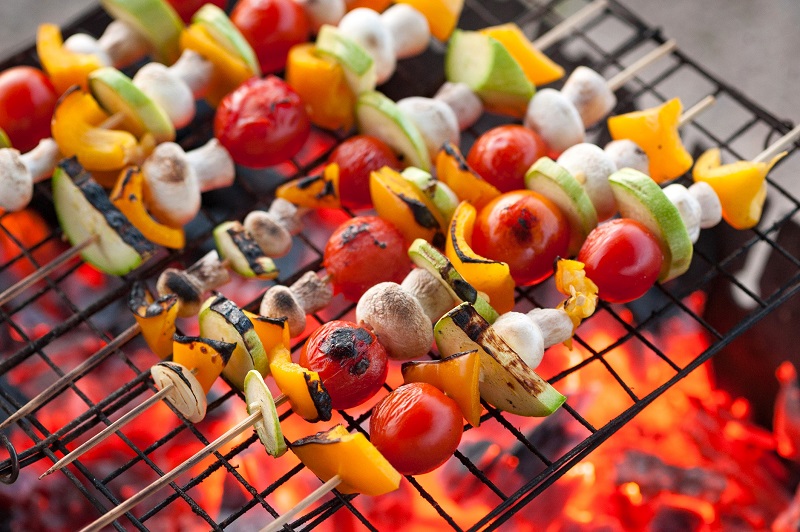
Ingredients: Assorted vegetables (such as zucchini, bell peppers, cherry tomatoes, mushrooms), olive oil, balsamic vinegar, garlic powder, dried herbs (such as thyme or rosemary), salt and pepper.
Instructions: Cut vegetables into bite-sized pieces and thread them onto skewers. Whisk together olive oil, balsamic vinegar, garlic powder, dried herbs, salt and pepper in a bowl. Brush the vegetable skewers with the marinade and grill until tender and slightly charred.
2. Cucumber and Tomato Gazpacho
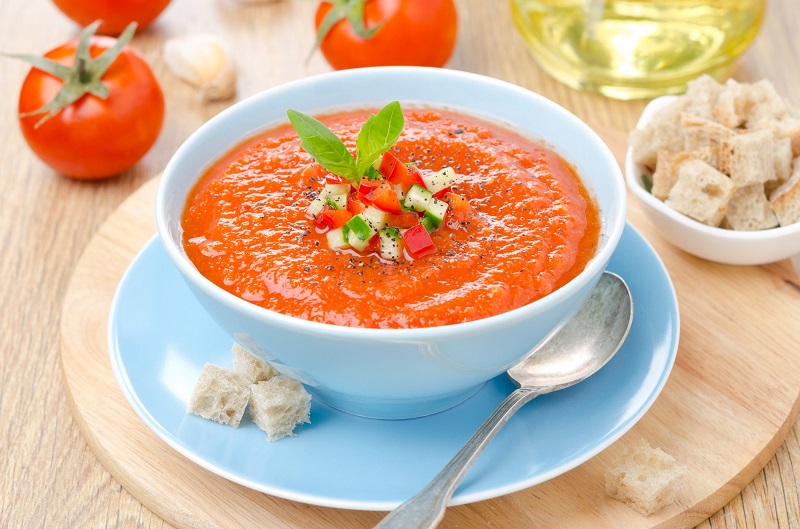
Ingredients: Cucumbers, tomatoes, red bell pepper, red onion, garlic, olive oil, lemon juice, salt and pepper.
Instructions: Blend cucumbers, tomatoes, red bell pepper, red onion and garlic in a blender until smooth. Stir in olive oil, lemon juice, salt and pepper. Chill in the refrigerator for a few hours before serving as a refreshing cold soup.
3. Steamed Broccoli with Lemon and Almonds
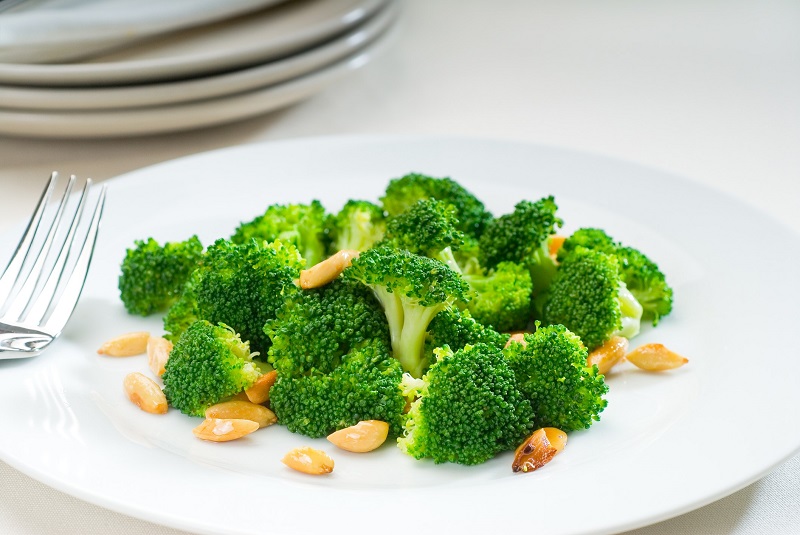
Ingredients: Broccoli florets, lemon zest, sliced almonds, olive oil, salt and pepper.
Instructions: Steam the broccoli until tender. In a separate pan, toast the sliced almonds until golden. Toss the steamed broccoli with lemon zest, olive oil, salt and pepper, then sprinkle with toasted almonds.
4. Tomato and Avocado Salad

Ingredients: Tomatoes, avocado, red onion, fresh basil leaves, olive oil, balsamic vinegar, salt and pepper.
Instructions: Combine sliced tomatoes, diced avocado, thinly sliced red onion and torn basil leaves in a bowl. Drizzle with a mixture of olive oil and balsamic vinegar, then season with salt and pepper to taste.
5. Zucchini Noodles with Pesto
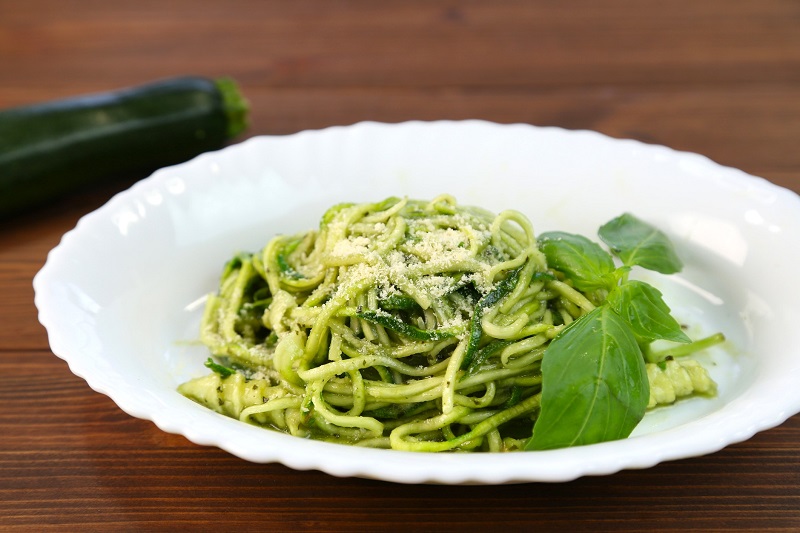
Ingredients: Zucchini, fresh basil leaves, pine nuts, garlic, grated Parmesan cheese, olive oil, lemon juice, salt and pepper.
Instructions: Use a spiralizer to turn zucchini into noodles. Blend basil, pine nuts, garlic, Parmesan cheese, olive oil, lemon juice, salt and pepper until smooth in a food processor. Toss the zucchini noodles with the pesto.
Looking for more delicious inspiration? Click here for 23 healthy summer side dish recipes! >
References
- Aune, D., et al. Fruit and vegetable intake and the risk of cardiovascular disease, total cancer, and all-cause mortality—a systematic review and dose-response meta-analysis of prospective studies. International Journal of Epidemiology. 2017;46(3),1029–1056.
- Lee SH, Moore LV, Park S, Harris DM, Blanck HM. Adults Meeting Fruit and Vegetable Intake Recommendations — United States, 2019. MMWR Morb Mortal Wkly Rep 2022;71:1–9.
- Blekkenhorst LC, Sim M, Bondonno CP, Bondonno NP, Ward NC, Prince RL, Devine A, Lewis JR, Hodgson JM. Cardiovascular Health Benefits of Specific Vegetable Types: A Narrative Review. Nutrients. 2018; 10(5):595.
- Jackson JK, Patterson AJ, MacDonald-Wicks LK, et al. Vegetable Nitrate Intakes Are Associated with Reduced Self-Reported Cardiovascular-Related Complications within a Representative Sample of Middle-Aged Australian Women, Prospectively Followed up for 15 Years. Nutrients. 2019;11(2):240. Published 2019 Jan 22.
- Przybylska S, Tokarczyk G. Lycopene in the Prevention of Cardiovascular Diseases. Int J Mol Sci. 2022;23(4):1957. Published 2022 Feb 10.




